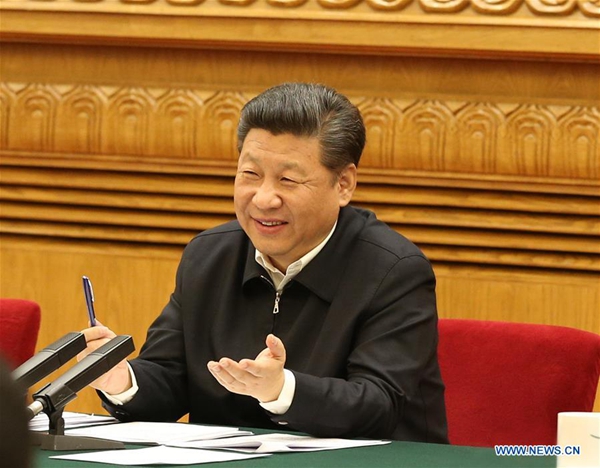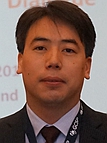You are here: Home
The views of experts on cyber security and informatization in China

Chinese President Xi Jinping, also head of the central internet security and informatization leading group, presides over a symposium on cyberspace security and informatization in Beijing, capital of China, April 19, 2016. [Xinhua/Ma Zhancheng]
Editor's note:
In his speech during a symposium on cyber security and informatization in Beijing on April 19, 2016, Chinese President Xi Jinping called for enhanced development of the internet and harnessing it for the benefit of the country and the people. On the one-year anniversary of his important speech, Chinese and foreign scholars shared their views on China's cyber security and informatization progress with China.org.cn:
In his speech during a symposium on cyber security and informatization in Beijing on April 19, 2016, Chinese President Xi Jinping called for enhanced development of the internet and harnessing it for the benefit of the country and the people. On the one-year anniversary of his important speech, Chinese and foreign scholars shared their views on China's cyber security and informatization progress with China.org.cn:

Shen Yi
Director, Research Center of Cyberspace Governance, Fudan University, Shanghai
Cyberspace governance leads to more freedom
Disciplining people's online behavior does not contradict President Xi's demand for more tolerance and patience to internet users. Shen stressed that internet users' behavior should also be subjected to supervision, the same as people's offline behavior.

Dr. Jon R. Taylor
Professor and Chair, Department of Political Science, University of St. Thomas, Houston
Much like the United States' relies on American-based "backbone enterprises" like Microsoft, Intel, and Google, President Xi's 2016 speech and the policies developed since his speech underscored the need for China to push for self-reliance and to promote Chinese information and communications technology alternatives, wherever and whenever it is feasible. As both a global economic and military power, such an approach makes sense for China. Strengthening China's innovation capacities will allow for Chinese companies and state enterprises to join forces in order to reduce foreign involvement in China's IT sector.
Something else to note that most Western media and commentators missed in Xi's 2016 speech: his concern that China is suffering from a serious issue with "brain drain," as talented young college students go abroad for their studies and often stay there. Xi urged technology firms to build talent structures that can recruit experts from many countries and draw Chinese expatriates back home. That call is now paying off with Chinese students returning home to work in their home country's burgeoning IT and high tech industries.

Dr. Zuo Xiaodong
Vice President & Senior Engineer, China Information Security Research Institute
Interconnected world requires enhanced cyber security
President Xi's new theories, ideas and conclusions on cyber security and informatization form an independent concept on governance of cyberspace with China's characteristics. They are part of his ideas about the governance of China, answering a series of major theoretical questions concerning the long-term development of China's informatization and providing comprehensive and clear strategic guidance.

Richard de Grijs
Professor, Astrophysics, Kavli Institute for Astronomy and Astrophysics, Peking University, Beijing
A careful balance needs to be struck between top-down and grassroots needs, restrictions, and ambitions. The internet is an immensely powerful tool for development, information exchange, opinion making, and communication, but users as well as governments need to take their responsibilities in setting their own boundary conditions; maintaining one's personal cyber security requires adoption of the same type of due diligence as for securing one's personal security in the offline world.
China's continuing opening up, including in the context of unrestricted internet access for its hundreds of millions of netizens, offers real promises of enhanced economic benefits and a reduction in the nation's digital (and economic) imbalance between the urban and rural populations.

Xiao Xinguang
Chief Technology Architect, Antiy Labs
Technological advancement essential to ensure cyber security
Without advanced defensive technologies, to guard against cyberattacks is like making bricks without straw. Only with powerful technologies could a country detect the menace and launch defense accordingly.

Einar Tangen
Political and Economic Affairs Commentator, CGTN America
Xi has been trying to balance the need for cyber defence and the desire for technological development. For the development community, government restrictions are counterproductive, for those charged with protecting the country, it is a necessity. Striking the right balance is about leadership.
Allegations that US intelligence hacked the SWIFT messaging system, used by banks to transfer trillions of dollars each day, hacked Microsoft's software, are examples of what every government fears. Beyond this, the ability to use of big data to manipulate public opinion, exhibited by Cambridge Analytics, in the passing of Brexit and the election of Donald Trump, indicate a new frontier of concerns.
On the development side, access restrictions to the internet can impede development and innovation. For China to realize its economic potential, it must be able to use the same information and tools, if it is going to successfully compete.
Achieving a happy medium is a challenge for all nations, the question is will China blaze a new path or follow established models. As pointed out, real solutions in these areas will be at best compromises.

Elenoire Laudieri Di Biase
Sinologist, University of Ca' Foscari & Melbourne University, Australia
Internet represents one of the most momentous headway in the history of humankind. Its development has changed and will continue changing the way people communicate, establish relations, do business and exchange information and knowledge. But it has also a dark side in that it can be used in an irresponsible way and with malicious intent. The inability of western legislators to properly regulate its use and fight its misuse has allowed a large amount of fake, illegal and harmful information to be easily accessible to anyone at any time.
It is therefore crucial that governments direct their attentions to the risks brought about by internet and, while enhancing its benefits and further development, adopt strategies to counter its deleterious use. In this regard, the speech President Xi Jinping pronounced a year ago at a symposium on cyberspace security and informatization outlines a positive platform for the Chinese government to make sure that internet remains a driving force for China's economic growth and an instrument of progress of its people.

Dr. Xie Xinzhou
Professor, New Media and Internet Communication, Peking University, Beijing
Credibility key to mainstream media in cyberspace
Mainstream doesn't mean being obsolete. Mainstream media certainly need to develop their online services, and consider how to make their voice heard by more people in a faster way through cyberspace.

Caleb T. Maupin
Journalist and political analyst, New York
Xi Jinping pointed out that the recent advances in computer technology present many great advantages, but also many potential dangers. Xi seems to understand that technology is best used for advancing prosperity and building a better world, not for sewing destruction and chaos. He points toward the way to carefully move forward and make sure that these technological advances are used for productive and beneficial purposes.







